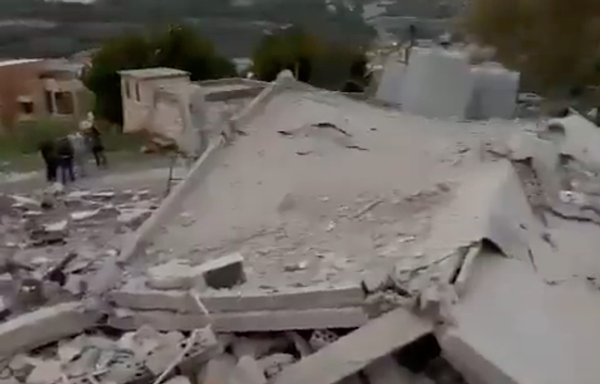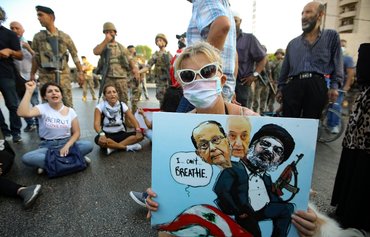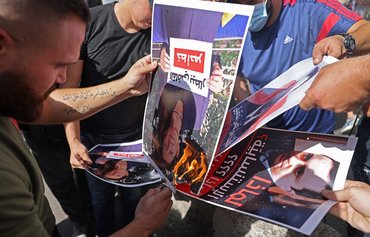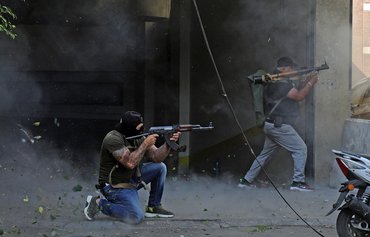BEIRUT -- A recent explosion in the Sidon district town of Bnaafoul has set off a flurry of speculation in Lebanon, with politicians and journalists voicing concern that violence will be used as a pretext to postpone upcoming elections.
This fear has been fuelled by a warning Hizbullah chief Hassan Nasrallah issued just hours before the April 12 blast in the southern town, which led to speculation that the warning and incident were somehow connected.
The blast went off at dawn, killing the son of the Bnaafoul mayor and wounding at least five others, some of whom are in serious condition. It destroyed an Amal movement scout troop headquarters and damaged the municipality building.
Local media reported that the explosion "occurred at an old weapons depot" belonging to Amal, situated near the municipality building.

A screenshot from a video circulated online shows the aftermath of a recent explosion in Bnaafoul, Sidon district, Lebanon, on April 12.
Amal meanwhile claimed that the explosion "was caused by a short circuit that led to a fire and the explosion of oxygen cylinders stored in the building".
According to Beirut-based news website CH23.com, an incident report submitted by a military-technical expert said the blast was caused by the detonation of explosives, which led to the collapse of the entire building.
Ammunition was found among the rubble, the report said.
The explosion, one of a series of similar incidents in recent years, appears to indicate that the Amal-Hizbullah duo has continued to store weapons in residential neighbourhoods, observers said, using civilians as human shields.
Nasrallah's warning
About three hours before the explosion, Nasrallah issued a warning "to those who want to fabricate events to disrupt or postpone the elections", said Fares Soueid, a candidate for the parliamentary elections representing Jbeil-Keserwan.
But this appears to be a political ploy, analysts said.
"In practical terms, there is only one party that is capable of delaying the elections or allowing them to be held on time and manipulating the security and stability of the country, and that is Hizbullah," Soueid told Al-Mashareq.
"No other party has the ability to disrupt the elections," he said, and no other party stands to gain as much as Hizbullah from a postponement of the elections.
In his speech, Nasrallah "indicates that he does not want the elections to be held", he said. This is "not for internal reasons such as the lack of electricity", he added, but for "external reasons directly related to the Vienna negotiations".
Hizbullah's backer, Iran, has been engaged in ongoing talks in Vienna with world powers over the revival of a 2015 nuclear deal that could see a lifting of sanctions on the Islamic Republic.
A successful conclusion to the talks could alter the political landscape in Hizbullah's favour, analysts said.
Hizbullah-Amal duo
Regarding the Bnaafoul explosion, Soueid noted that "no official investigation by the state or its security services has been released so far about what happened".
"All we have seen is the deployment of Hizbullah elements in the vicinity" of the building where the blast went off, he said, adding that it is not known "if the explosion was accidental or contrived, or what kind of materials were involved".
Hizbullah "conducted the investigation itself, just as it did with the Beirut Port explosion," he said, referring to the massive explosion in 2020 that left 206 dead and more than 6,000 others injured, and destroyed swathes of the Lebanese capital.
The reason for the Bnaafoul explosion is still unknown because of conflicting accounts, amid the absence of an official report, Lebanese Centre for Research and Consulting director Hassan Qutb told Al-Mashareq.
According to local residents, he said, "the Amal militia prevented the army from investigating and identifying the materials that exploded or the direct cause of the explosion".
He said "the militias are active and effective, and have political cover by virtue of the fact that the head of the Amal movement is Parliament Speaker Nabih Berri".
Qutb said he does not know if the blast was caused by "negligence and poor storage of dangerous materials, or if it was contrived to create confusion".
Of the latter possibility, he noted that "it comes in the context of the verbal escalation about the potential postponement of the elections".
He said the Amal-Hizbullah alliance "is political on the outside, but militia-oriented at its core, because they are the only sides who have armed militias with free pass security ID cards".
"They have a joint security operations room to co-ordinate responses and tasks, and while they don't see eye to eye on some internal or external issues, they justify their alliance under the pretext of 'resistance'," he said.
No proper investigation
"All hypotheses are on the table with regard to the cause of the explosion, because the security services are prevented from conducting an investigation while Amal and Hizbullah gunmen are present at the crime scene," said political writer George Akouri.
This has been the case with similar incidents in the past, he said, "with no official statements issued but rather statements by the Amal movement explaining what happened from its point of view".
This diversion fosters suspicion about the causes of the explosion, he said, and raises questions about the state's role in investigating these explosions, and whether these areas are "off limits" to them.

![People react next to a damaged vehicle near the site of an explosion at a building that belonged to the Islamic Risala Scouting Association, affiliated with the Amal movement, in Bnaafoul, near Sidon, on April 12. [Mahmoud Zayyat/AFP]](/cnmi_am/images/2022/04/21/35008-Lebanon-Sidon-blast-600_384.jpg)






